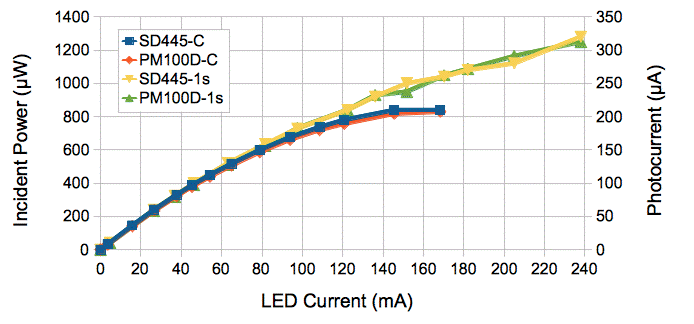The LED Head (A2079) provides one or two LEDs (light-emitting diodes), a power dissipation resistor, and a flex socket to receive the LED forward current. These LEDs might be use as BCAM Light Sources.

In the photograph above, we have an anodized aluminum fixture holding a zirconia ferrule, part number BSC-PSB, close to the surface of a C460EZ500 LED die in the QFN-8 package. At the far end of the fiber, out of the picture, is an FC connector.
| Version | Description |
|---|---|
| 2079A | Single LED Head (R1, R2 = 75 Ω, D1 = EZ500/QFN-8), FLEX-6 Socket |
| 2079B | Single LED Head (R1, R2 = 22 Ω, D1 = EZ500/QFN-8), FLEX-6 Socket |
| 2079C | Single LED Head (R1A, R1B, R2A, R2B to suit LED, D1 = Luxeon Z LED), FLEX-6 Socket |
| 2079D | Heat Sink Mounting Board for Luxeon Z LEDs, FLEX-6 Socket |
| 2079D | Heat Sink Mounting Board for Luxeon Z LEDs, MOLEX-2 Plug |
The A2079A provides a blue EZ500 LED die mounted in a in a 3 mm × 3 mm QFN-8 package as shown in LED Fiber Coupling. For a mechanical drawing of the A2079A circuit board see A2079A_View. Its typical forward voltage drop is 3.2 V. On the board is a 1-W, 38-Ω resistor made of two 0.5-W, 75-Ω resistors. The A2079A is designed to work with the Fourteen-Way Switch (A2078A). The A2078A connects 15 V in series with a 6-W, 50-Ω resistor to the A2079A, so that 135 mA flows through the LED when the switch is on. The A2079B is identical to the A2079A, but with lower series resistance for higher current.

The A2079C provides one LuxeonZ LED, either the color or white version. The LuxeonZ is a 1 mm × 1 mm LED in a 1.7 mm × 1.3 mm package with pads on the bottom. Its maximum forward current is 1000 mA for the royal blue, blue, cyan, and green colors, 700 mA for lime, amber, red-orange, red, and deep-red, and 1000 mA for the white versions.
[05-NOV-13] The A2079A is equipped with a C460EZ500 LED. We placed two optical power meters ten centimeters from the LED. One photodiode is a Hamamatsu S2281 packaged as a Thorlabs S120C and connected to a Thorlabs PM100D meter. The exposed area of the photodiode is 10 mm in diameter. The other photodiode is an Advanced Photonics SD445 connected to an ammeter. This photodiode is 10 mm square.
We increase the LED current slowly, allowing the LED to reach equillibrium temperature in air at each current. We find that the optical power output of the LED stops increasing above a current of 130 mA. We repeat the experiment, switching the LED current on for 1-s pulses and measuring the optical meter power and ammeter current.

We drive 10 mA through the EZ500 and press the LED up against our SD445 photodiode. We obtain a photocurrent of 1.74 mA. Our previous experience with the SD445 suggests that its sensitivity to 460-nm light is 0.18 mW/mA, so we believe the EZ500 is emitting 9.7 mW at 10 mA. We try to press the EZ500 up against our S120C photodiode but we the LED remains a few millimeters from the photodiode surface. The power meter records 6.18 mW. We use our 9.7 mW at 10 mA measurement to perform a one-point calibration on the SD445 relative power measurement we plotted above, and so obtain a plot of C460EZ500 output power versus LED current for both continuous and pulsed operation in air.

The EZ500 is rated up to 300 mA continuous forward current. Today's results suggest that for pulses of 1 s or less, we can get 110 mW at 150 mA current and perhaps 160 mW at 300 mA.
Our injector housing is the anodized aluminum piece we show above. It holds the end of a 2.5-mm a zirconia ferrule above an EZ500 LED. This LED has a bond wire above its surface. If the ferrule presses the bond wire down, it shorts to the edge of the LED package. Our BSC-PSB ferrules have a nominal length 7.95 mm. The thickness of the injector housing determines how far above the LED surface will be the tip of the ferrule. The graph below shows how power injected into a 62.5 μm core NA = 0.22 fiber at the center of the ferrule varies with the thickness of the injector housing.

Board No10's bond wire was shorted by the thinnes housing. Board No9's power dropped to 45 μW for the thinnest housing because the LED was poorly centered. At thickness 8660 μm (0.341"), we obtain more than 100 μW with all LEDs and suffer no problems with alignment or shorting.
Note: All our schematics and Gerber files are distributed under the GNU General Public License.
S2079_1: Dual LED Head.